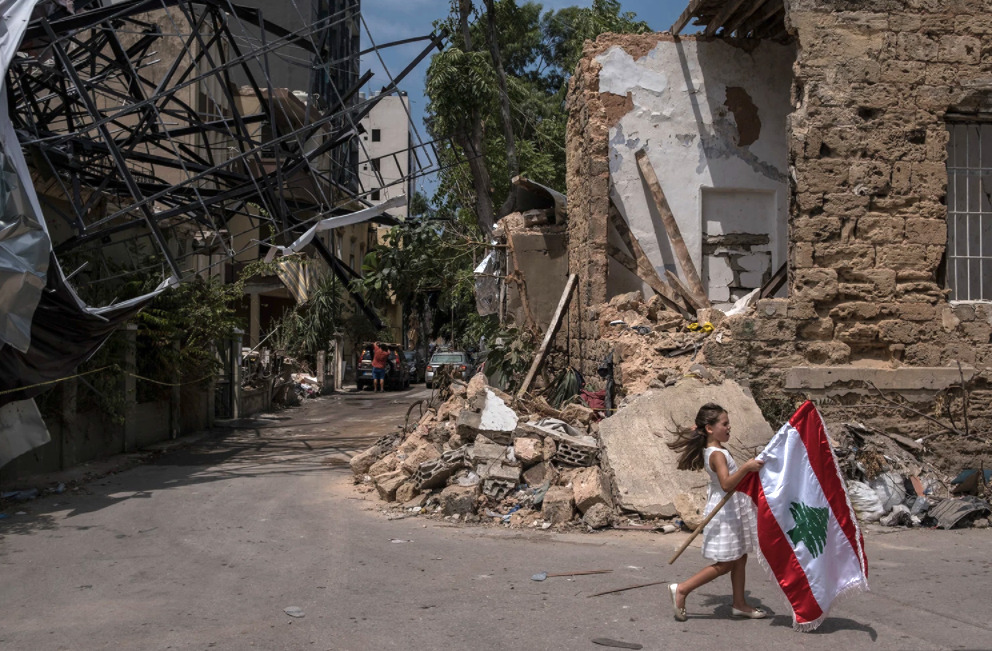Editor’s Note: This article contains written description, audio and images that may be disturbing to readers. These descriptions and visuals contain images of blood, injury and violence.
Even though the global news cycle has moved on from the tragic explosion in Beirut earlier this year, the people of Lebanon have not. Veteran journalist Sharmine Narwani shared her experiences, images and opinions of the incident after several months of digestion and reflection. In the face of calls for an impartial investigation into the origins of the explosion, she also offers her opinion on who the potential perpetrators may be. We discuss living through the trauma and Lebanon’s next steps.
Q: What do people who were not living in Beirut at the time not understand about the experience of living through a moment of pure chaos and brutality?
A: I’ve been in various war zones — in Syria close to the frontlines, once with mortars flying over my head – but I’ve never been inside an explosion. What do I mean by that? It’s very, very different being the victim of an aggression, as opposed to watching it, even from a close distance. Sound ceases, movements slow down, time is weird, you remember every single detail yet it becomes ridiculously difficult to describe the event. Everyone I know in Beirut who were victims of that explosion thought a bomb had gone off right outside their homes – that’s how severe the force of the blast seemed. When we heard it was a few miles away at the Beirut Port, we were stunned. How could an explosion be that huge? The blast was obscene. Nobody believes it was an accident. I was sitting near a wall of windows when it happened and I felt like a truck hit my head. I don’t understand how I only have a few small cuts when all that glass exploded right onto me. Every window and frame in my home was destroyed, entire ceilings collapsed, and we had to crawl down to pass through our caved-in lobby entrance. We’re lucky to be alive.
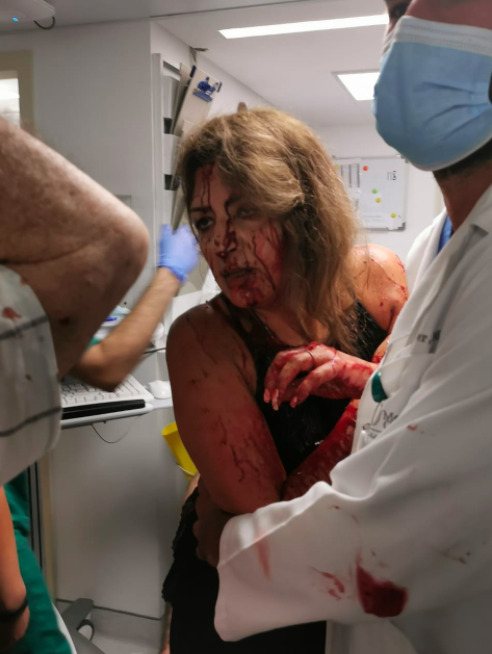
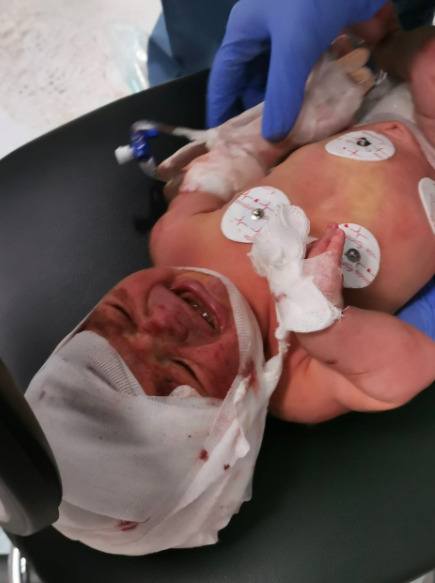
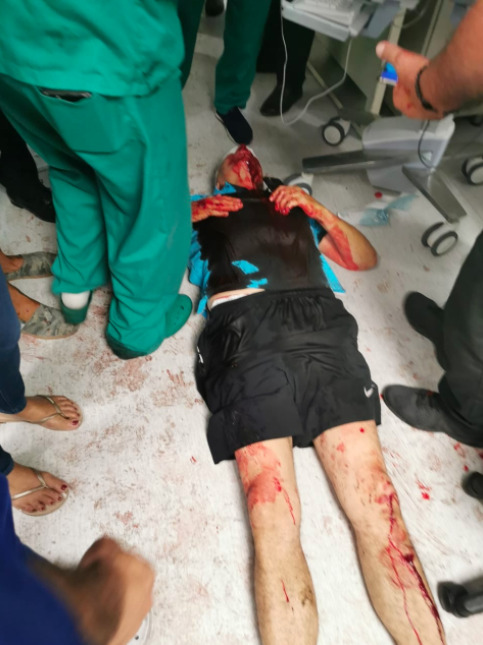
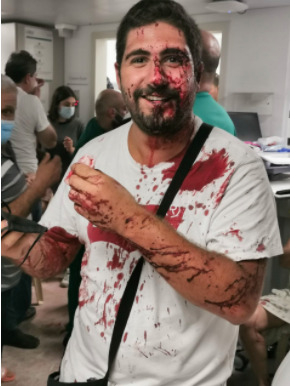
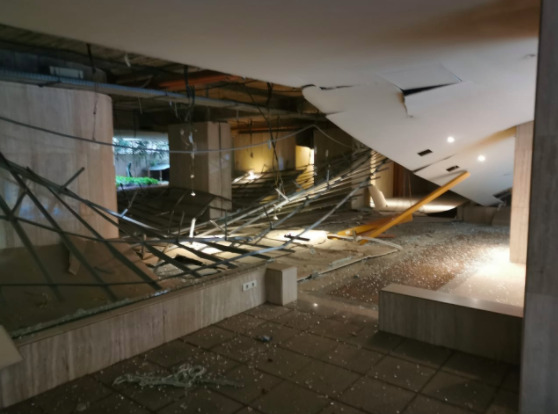
You ask about chaos… Yes, while people were streaming out of their homes, bloodied and shocked, windows and entrances shattered everywhere, a carpet of glass crunching under our feet as we sought safety, it may have looked like chaos. But I’m telling you there was such consideration, unity and respect in those hours and days that followed, it didn’t feel the least bit chaotic. This was a profoundly moving experience for me. It turns out people don’t become selfish and savage when they’re hurt and desperate. At least not in Lebanon. Everyone pitched in to make way for the wounded. My housekeeper had three of her fingers severed by flying glass. Our local pharmacist raced outside her devastated store to flag down a car to take us to the hospital. The elderly man in the passenger seat was covered in blood, head to toe but nobody complained or cried out in pain. When we got to the hospital, we quieted down even further as we walked past the limp bodies sitting or lying on the floor outside. Inside the emergency room, the scenes were more bleak. The most urgent cases were here, people who weren’t moving, whose faces couldn’t be seen through the blood.
It looked chaotic, but didn’t feel it. Everyone seemed to instinctively understand when to speak up and when to make way for someone whose life was hanging in the balance. I started taking pictures — my instinct as a journalist. I’ve never loved Lebanon or the Lebanese more.
Sharmine Narwani recounts her experience during the bombing in a conversation with her uncle. Glimpse from the Globe has obtained the audio with her permission.
Q: We are now three months removed from this tragedy. What are some initiatives you have seen in these months to rebuild, both from the private and public sector, and have the efforts tangibly impacted those affected? Has there been any corruption involved?
A: Rebuilding started the very next day ‒ which is when we really started to feel the shortages in the country. It was near impossible to secure glass or steel or even drywall in those early days, even if you knew a provider, you’d have to wait in a long line for your turn. International aid poured in and Lebanese and foreign NGOs began amassing at the worst-hit sites. One initiative I personally know of is the International Committee for the Red Cross (ICRC) and local physicians offering free surgery and rehabilitation for victims of the blast. My housekeeper has an ICRC-organized physiotherapist who comes to our home every week to work on her damaged hand. Foreign aid aside, some of the best assistance was done locally, by the Lebanese. A yoga teacher I know collected money from eager donors and helped dozens of families get back on their feet. Aid was pouring into the affected areas, but the country has been in a deep and unprecedented financial crisis since 2019, so [the yoga teacher]and others diverted aid to areas well beyond the blast zone which happens to be a relatively affluent part of Beirut. I’m sure there was corruption, but that’s normal for Lebanon. Mostly though, the thing that irked me was when providers of building materials raised their prices because demand was high. I’ve seen that in the Syrian conflict too and it really is the most inhumane thing — to make a quick buck off a crisis.
Q: How does the local reaction differ based on socioeconomic status?
A: The explosion hit relatively well-to-do areas in Beirut, so that was in some ways a mixed blessing. The Lebanese Lira has already lost about 80% of its value over the past year because of the country-wide financial crisis, so I’m not certain how those who have neither jobs nor money could have coped if they had to deal with the explosion as well. The more affluent Lebanese haven’t seen something like this in their lifetimes, so those with second passports immediately started to consider leaving Lebanon. But even that has become a difficult prospect ‒ banks have not been allowing depositors to withdraw their funds for over a year now.
Q: How will this affect geopolitical tensions and ambitions in the broader region?
A: Despite official statements from politicians and several political parties that the explosion was an “accident,” the Lebanese do not believe this. They also largely believe their politicians are lying to them to avoid having to react to Israel, the most cited suspect behind the explosion. Certainly tensions have been heightened in the country after the blast, but one has to look at the whole picture too. The Lebanese financial crisis has made it impossible to import anything except essential goods like food, medicine and fuel ‒ the country simply doesn’t have enough dollars to pay for goods. The currency has completely collapsed, making it hard to purchase even those goods. The banks are holding on the depositors’ money and life savings. The Americans are piling economic sanctions of people and businesses and refuse to let the Lebanese government fire the corrupt Central Bank Governor. Frequent lockdowns over Covid-19 have seen tens of thousands of businesses shut down and at least a quarter of the country’s population laid off. Then this unexplained, suspicious blast happens, and then ‒ completely contrary to what should happen ‒ the Lira gathers some strength the very next day. People can see that things are being manipulated, but to what end ‒ that’s the question.
Consecutive U.S. administrations have failed at making Iraq, Syria [and]Iran heel, and so they have now turned their sights on Lebanon, home to Hezbollah, Israel’s most feared adversary. The U.S. is applying maximum pressure ‒ both economic and political ‒ to get the Lebanese to make Hezbollah disappear, but that is a virtual impossibility. Hezbollah received the most votes in the last parliamentary elections and its two biggest allies came in second and fourth. It’s Christian ally the Free Patriotic Movement is the largest Christian political party in the country, and its leader is the current President of Lebanon.
But all U.S. actions in this region have unintended consequences, usually to the detriment of Washington and to the benefit of its adversaries. American efforts to squeeze Lebanon’s economy until it capitulates will instead ‒in my view ‒ turn the country eastward, where it will eventually start to buy oil and medicine from Iran, food and clothing from Syria, bring in China to rebuild its ports and electricity plants, buy Russian weapons, etc. So I think that’s going to be the general thrust of things ‒ and there are Lebanese calls for this to happen.
Q: What are the ideal next steps for Lebanon in your opinion, and does the international community have an obligation to help?
A: Nation-states shouldn’t be nation-states if they lack the basics ‒ sovereignty and territorial integrity. Lebanon needs to stand on its own two feet, grow its own food, produce its own goods and services. This is a part of the world that has, since colonial times, been urged to create dependencies. Well that’s not how a country grows and prospers. The Lebanese are possibly the most entrepreneurial, multicultural people I’ve ever come across ‒ they can do this. But first they need to cut their dependencies, their costs, and their corrupt ways. They are currently hankering over a multi-billion dollar loan from the IMF that will go nowhere near paying off the country’s debt and setting it on the right path. If anything, the IMF loan will deepen the country’s dependencies. Lebanon needs a new political and economic direction, and the time is right for that because its old allies in the West have become poorer and less powerful, and there is a well-defined and prosperous project in the East ‒ the Chinese Belt and Road Initiative ‒ that could lift Lebanon out of its general malaise.
Q: Should Lebanon view this experience as a restart? Should they instead reject the international community and try to rebuild from the inside without foreign influence? Is there a silver lining at all?
A: Yes, this isn’t just a restart for Lebanon but for many other nations in West Asia and beyond. As American economic power declines, so does its political and military reach. Old allies in the region — and even in Europe — are reconsidering their alignments and are repositioning themselves to, at the very least, be non-aligned. Non-alignment also means you can trade and deal with all countries — currently not the case with Lebanon, which needs U.S. and French permission on everything from commercial contracts to naming ministers to the cabinet.
Most importantly, this is sink-or-swim time for countries like Lebanon. Can they exist as a nation-state without foreign states propping them up? There’s no point in realigning oneself into yet another dependent alliance. I believe as the global economic collapse deepens, states with no function will cease to exist and new borders will be formed. It’s historically how things evolve during times of seismic change. Lebanon has all the ingredients necessary to transform itself quite brilliantly, if only its polarized body politic stops infighting and defines a brave new direction for the state.
Correction: A previous version of this article stated that Sharmine Narwani was a Lebanese journalist. Sharmine is based in Lebanon, but is not a Lebanese citizen. Glimpse from the Globe regrets this error.


